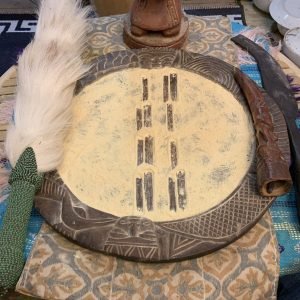Cultivating Iwa Pele, and Self Love
On this day of veneration of Obatala we are encouraged to reflect upon the Odu of Iwori Obara and a verse of Ifa within it that speaks about safeguarding ourselves from self destructive behaviors, actions, and suicide even, be it physical, mental, emotional, or spiritual.
Some of the ways that this can manifest itself include distancing ourselves from our spiritual community of brothers and sisters, elders, one's Oba, our Oluwo or Iyanifa, or those we share relations with. It can show up in neglecting to take time for prayers and veneration, holding grudges, choosing to actively nurture our personal triggers, choosing to live from our place of wounding, an unhealthy view of masculine and feminine vessels, personal biases, unrealistic expectations, seeking to assert dominance rather than managing our own lives... The forms this can show up are virtually unlimited. We see some of this reflected in the world we live in today and also in our own communities; these are things all humans wrestle with personally, no matter how elevated we might be or believe ourselves to be.
Ifa teaches us, for example, that one's choice to actively engage in self-harming behaviors or harboring negative thoughts, while also believing we have reached a place of elevation where we no longer need to model gentle behavior or humility is one fast way to which bring in and welcome the Ajogun (independent malevolent forces) into our lives.
In the case of self-defeating behavior or thoughts, the Ajogun is Elenini - self created demons.
Obatala is the molder of heads and humanity. It is from Obatala that we learn what Iwa Pele is. Stories explain that Obatala created Iwa (character) from the calabash of Igba Iwa for the humans he molded. Obatala created “ASE” even. Any time we say “ASE” we are speaking Obatala language and calling upon this deity in our lives and the many lessons he brings to bear.
Many make the error in thinking that Iwa Pele means “good character”, however Iwa Pele actually translates more to mean “gentle character”.
For Obatala and his divine consort Yemoo, one of their sacred symbols is the egg, called eyin in Yoruba. Think of how one holds an egg in their hand. Do you squeeze in your fist? Or does one hold an egg gently? This should be how we model our relationships with one another, our communities, and how we go about in life. When one is no longer accountable or a teachable person in life we can find ourselves living the Ibi (negativity) of our Odu.
Anytime we choose to live and nurture the Ibi of our Odu is a time when many blessings that perhaps are in store for us we now find ourselves off track to receiving. Ifa speaks on this very thing in the Odu Ifa of Iwori Obara, which I mentioned at the outset.
Ifa says,
He who consumes an entire corn meal and plans on committing suicide by hanging himself
What does he expect the person who eats the leftovers in the cornmeal wrapper to do?
This was the declaration of Ifa to Iwori o p'ajuba
When going into forest to hang himself
He was advised to offer ebo
He complied
Iwori o p'ajuba, don't give into anger and frustration
Iwori o p'ajuba, don't hang yourself
All Ire of life is coming from the front
All benefits of life is coming from behind.
This means that it may be at the exact time that this person is planning to take away their own life, or is engaged in otherwise self destructive behavior, that all the Ire which they lacked will come tumbling their way.
May Obatala hold our lives gently as one would hold an egg. May our lives model Iwa Pele and balance. May we forgive others of offenses, be they real or perceived, as we pray and ask the deities to do the same for us, and may we enjoy the gift of life that has been bestowed upon us with the fullness and joy it deserves in the time that is given to us by our creator.
Remember venerating Obatala and Egungun on their shared day of worship teaches us a valuable lesson. As we reflect upon life we are also reminded of our own mortality and the sacredness of the time we have while we are here in this physical human vessel. Think about how you want to be remembered and reflect upon the fact that each day we have may be the last to greet one another as community, to greet one another as spiritual family, to greet our personal families in our homes, to greet all humanity that we meet in our day to day lives, and all forms of life that inhabit the world we live in.
Let us use our time with one another and the world wisely and with care.
Eepa Orisa! Orisa Eepa Obatala Alaso Funfun

